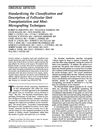Search
for
Sort by
Research
420-450 / 1000+ resultsresearch ESDR589 – Platelet Rich Plasma Combination Therapies for Treatment of Androgenetic Alopecia: A Systematic Review
research Vellus-To-Terminal Hair Follicle Reconversion Does Occur In Male Pattern Balding In A New Humanized Mouse Model Of Androgenetic Alopecia And Is Promoted By Minoxidil And PRP
research ESDR564 – Vertex and Occipital Intermediate and Terminal Hair Follicles from Androgenetic Alopecia Patients are Differentially Affected by Testosterone Ex Vivo
research The Role of Rare Variants in Male-Pattern Hair Loss: Analysis of Whole Exome Sequencing Data in the UK Biobank
research ESDR072 – COVID-19 and Male Androgenetic Alopecia: Systematic Investigation of a Potential Epidemiological and Genetic Association
research Poor Perifollicular Vascularization Is Associated With Nutrient Insufficiency and a Quiescent Metabolic Phenotype in Intermediate Hair Follicles From Patients With Female Pattern Hair Loss
research Adverse Effects at the Level of Marginal Periodontium Secondary to Finasteride Administration
research PSA Concentration Change in Men Taking Low Dose Finasteride and Dutasteride for Male Androgenetic Alopecia

research Treatment of Chronic Severe Alopecia Areata with Topical Diphenylcyclopropenone and 5% Minoxidil: A Clinical and Immunopathologic Evaluation
DPCP helps treat severe hair loss, but 5% minoxidil doesn't add benefits.

research Incidence of Virilization in Sex Cord Stromal Tumors of Ovary: A 5-Year Experience in a Tertiary Care Gynecological Center
Some ovarian tumors can cause masculinization, and it's important to check for various causes when this symptom is present.

research Dermoscopy Evaluation of Therapeutic Response in Alopecia Areata
Dermoscopy is useful for tracking alopecia areata treatment, with yellow dots and new vellus hairs being good indicators of hair regrowth.

research Progress of Integrated Medicine in the Treatment of Androgenic Alopecia
Traditional Chinese Medicine, combined with antiandrogen therapy, could improve treatment and reduce side effects for genetic hair loss.

research Altered Brain And Pituitary Androgen Metabolism By Prenatal, Perinatal Or Pre- And Postnatal Finasteride, Flutamide Or Dihydrotestosterone Treatment In Juvenile Male Rats
Treatment during development affects hormone balance and sexual behavior in male rats.

research Clinico-Pathological Profile of Cutaneous Lupus Erythematosus Patients: A Report from a Tertiary Care Center of Chattogram
Most patients with Cutaneous Lupus Erythematosus are young females, and dermatologists play a key role in diagnosis.
research Abnormal Neuronal Differentiation and Mitochondrial Dysfunction in Hair Follicle-Derived Induced Pluripotent Stem Cells of Schizophrenia Patients
Schizophrenia patients' stem cells show abnormal neuron development and mitochondrial issues.
research Skeletal Site-Dependent Expression of the Androgen Receptor in Human Osteoblastic Cell Populations
Higher androgen levels and site-specific AR expression cause sex-related skeletal differences, and certain steroids can boost AR expression and androgen effects in bone cells.
research Thyroid Hormone Receptor β1 Is Expressed in the Human Hair Follicle
Thyroid hormone receptor β1 is found in human hair follicles and helps them survive.

research The Effects of Transdermal Dihydrotestosterone in the Aging Male: A Prospective, Randomized, Double-Blind Study
Dihydrotestosterone gel improved well-being and sexual function in older men without negatively affecting prostate health.

research Vitamin D Resistant Rickets With Alopecia: A Form of End Organ Resistance to 1,25 Dihydroxy Vitamin D
A girl with rickets and hair loss was found to have a rare condition where her body didn't respond to vitamin D treatment.
research Frontal Fibrosing Alopecia: Clinical and Prognostic Classification
Researchers found three patterns of Frontal fibrosing alopecia, with Pattern III having the best prognosis after treatment.

research Permanent Scalp Alopecia Related to Breast Cancer Chemotherapy by Sequential Fluorouracil/Epirubicin/Cyclophosphamide (FEC) and Docetaxel: A Prospective Study of 20 Patients
Some breast cancer chemotherapy can cause permanent hair loss.

research A Prospective Study of Cutaneous Adverse Events Induced by Low-Dose Alpha-Interferon Treatment for Malignant Melanoma
Most patients treated with low-dose alpha-interferon for malignant melanoma experienced skin side effects, with hair loss being the most frequent.

research Mucocutaneous Side Effects of Antineoplastic Chemotherapy
Chemotherapy often causes hair loss, nail changes, and mouth issues, but these are usually manageable.
research Expression of Peroxisome Proliferator Activated Receptors (PPARs) in Human Hair Follicles and PPARα Involvement in Hair Growth
PPAR alpha may help in hair growth and could be a target for treatment.

research Scalp Cooling Has No Place in the Prevention of Alopecia in Adjuvant Chemotherapy for Breast Cancer
Scalp cooling is largely ineffective in preventing hair loss from breast cancer chemotherapy.

research Quantification of Reproductive Hormones in Hair of Captive Adult Brown Bears and Their Application as Indicators of Sex and Reproductive State
Measuring reproductive hormones in brown bear hair could help identify their sex and reproductive state, but better collection methods or lab techniques are needed.

research Standardizing the Classification and Description of Follicular Unit Transplantation and Mini-Micrografting Techniques
Surgeons suggested a standard system for hair transplant methods to improve communication and results.

research Clinical Management of Cutaneous Adverse Events in Patients on Targeted Anticancer Therapies and Immunotherapies: A National Consensus Statement by the Spanish Academy of Dermatology and Venereology and the Spanish Society of Medical Oncology
Spanish experts provided guidelines for treating skin side effects in cancer patients on new therapies, stressing early action and teamwork.

research Adverse Cutaneous Reactions to the New Second-Generation Tyrosine Kinase Inhibitors (Dasatinib, Nilotinib) in Chronic Myeloid Leukemia
Many patients on new leukemia drugs had mild to moderate skin reactions.